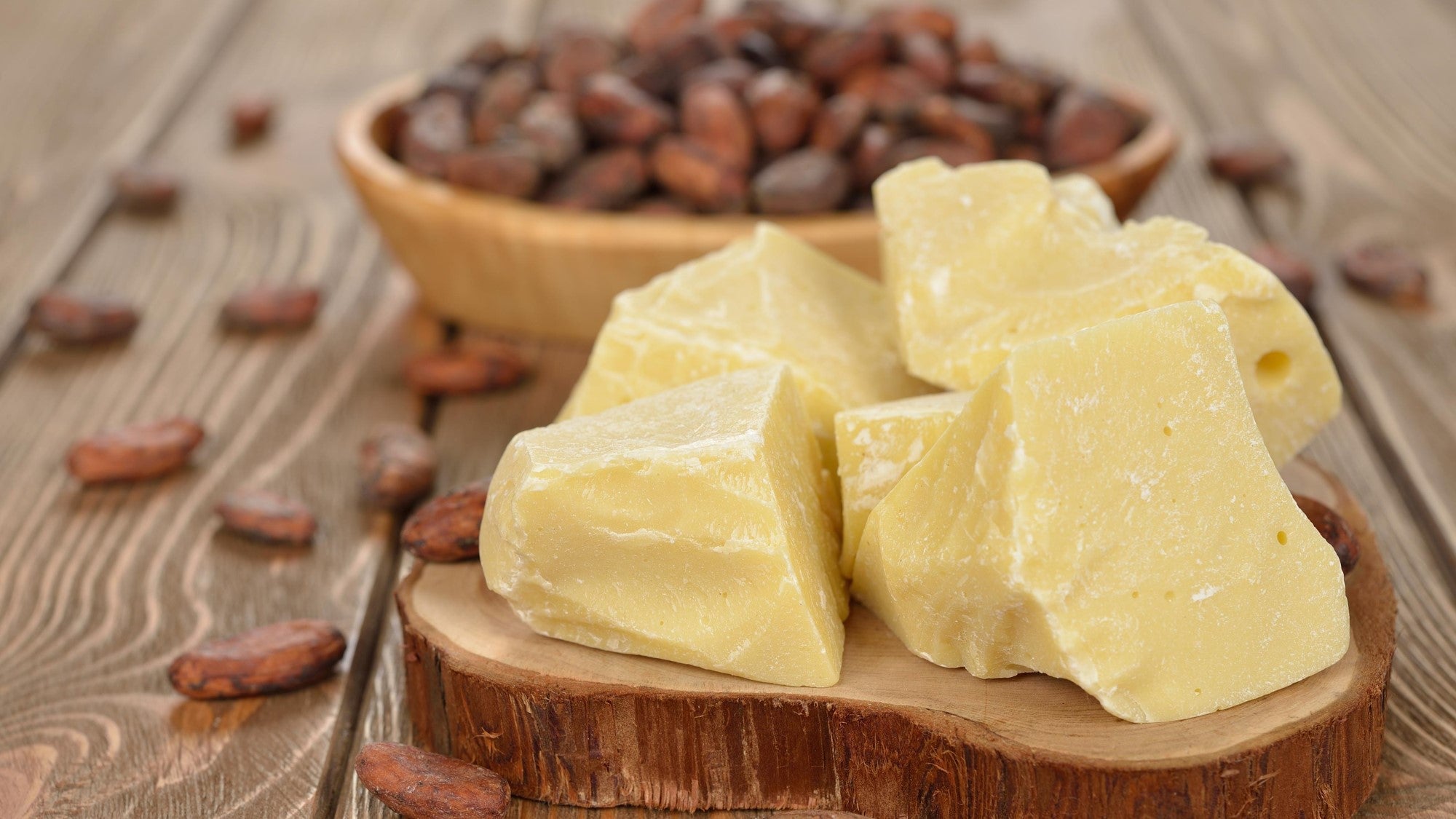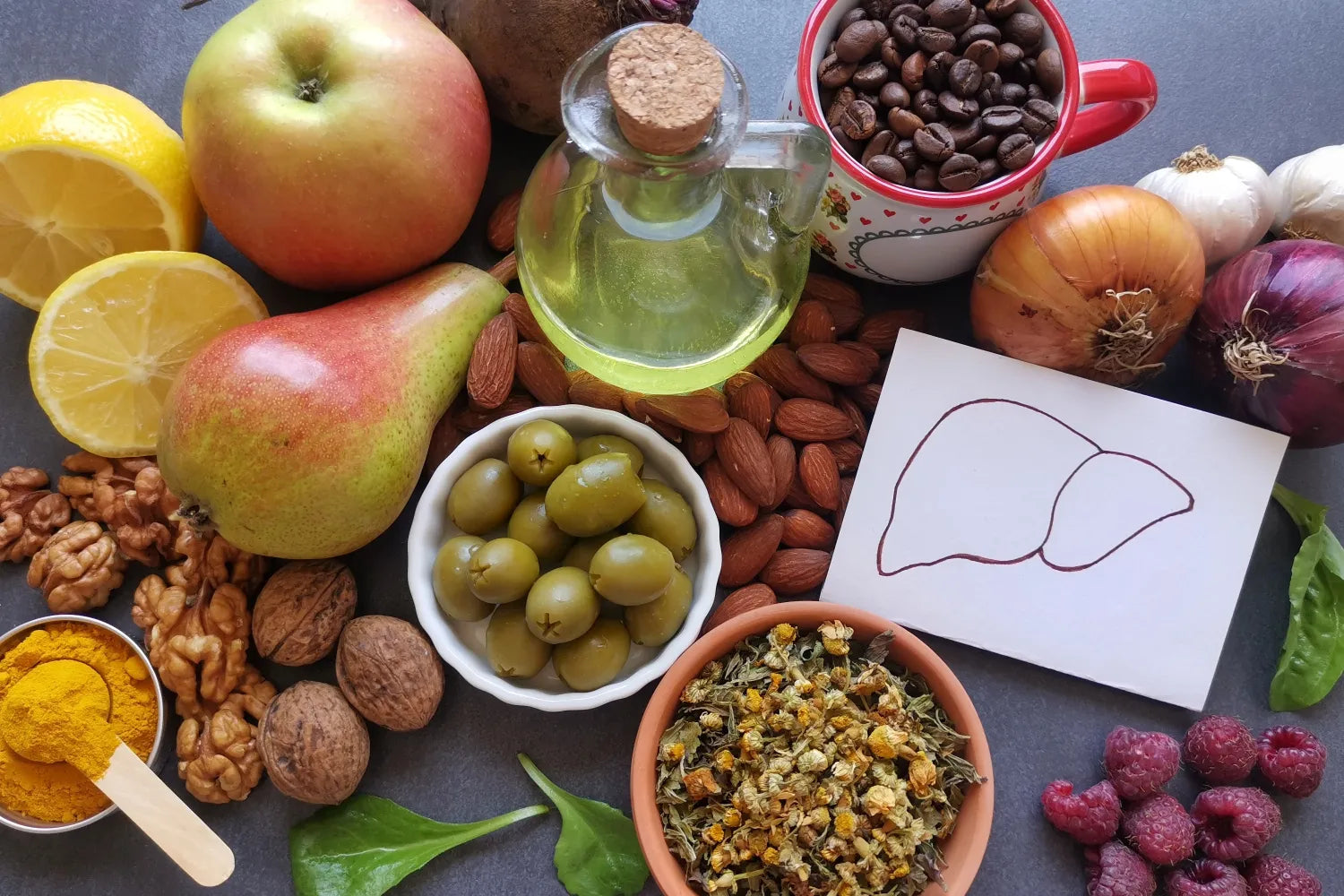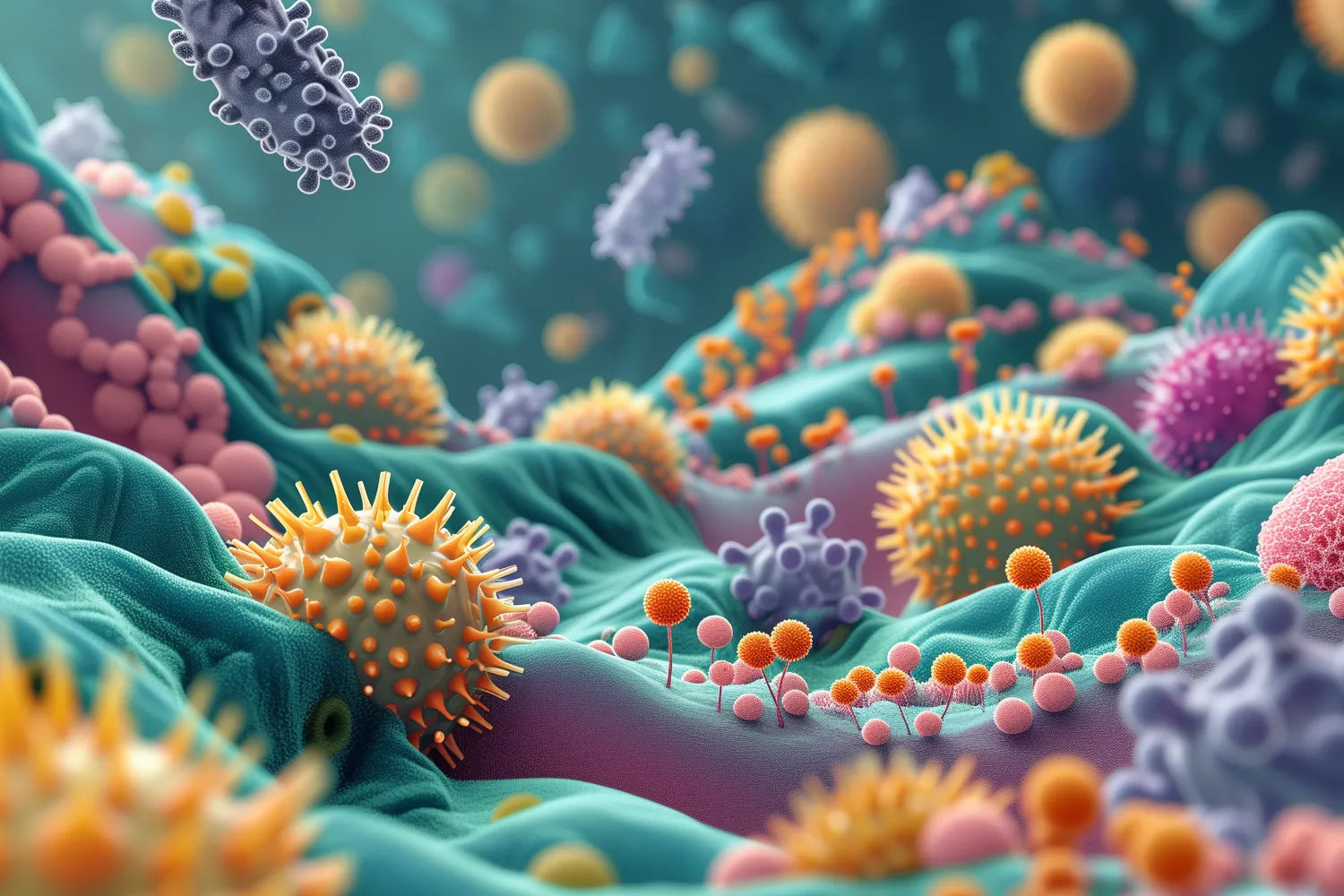
Dr. Eric Venn-Watson’s Highlights
-
- Cocoa butter has been used for centuries for skin benefit and nutritional content.
- Cocoa butter contains fats and nutrients that can be beneficial in the right products.
You’ve probably been using cocoa butter products on your skin since you were small. Cocoa butter has been used for centuries to treat common skin problems like dryness and irritation. You might be surprised to find out that cocoa butter can also be used in cooking, similar to the way in which you use other cooking oils.
Cocoa butter is a natural ingredient derived from cocoa beans, making it a popular ingredient in every kind of product from lotions and creams to chocolate bars and stir frys.
Let’s cover what cocoa butter actually is (is it dairy, or isn’t it), what the benefits of cocoa butter use are, and how it can benefit you nutritionally. We’ll also talk about how using fats, like cocoa butter, can be beneficial for your health.
What is Cocoa Butter?
First off, cocoa butter isn’t dairy. Cocoa butter gets its name because of its thick, creamy texture, which most closely resembles cow’s butter. Cocoa butter, however, isn’t made from milk. Cocoa butter is derived from cocoa beans.
Cocoa beans grow on the cacao tree, which is native to rainforest areas, as well as west Africa and parts of Asia. The cacao tree produces large pods which contain cocoa beans. The first step in extracting cocoa butter is to remove the beans from the pod.
Next, the beans undergo a process of fermentation, drying, and roasting before the cocoa butter is pressed from them. Once pressed, the butter is ready to be used in products or in cooking.
If you’re wondering what gives chocolate its smooth, rich texture, and just about half of its flavor, the answer is cocoa butter. Even though chocolate is a great treat, it’s not the best way to get the most benefit from pure cocoa butter.
3 Top Cocoa Butter Benefits
Aside from giving chocolate it’s amazing, addictive creaminess and flavor, what other benefits can you get from cocoa butter? Cocoa butter has a lot to offer, but let’s look at what gives it its health benefits in the first place.
Nutrient Profile of Cocoa Butter
In order to understand why cocoa butter can potentially help our bodies, it’s important to look at it’s nutrient profile. Here are the most important compounds found in cocoa butter.
- Oleic Acid and Stearic Acid. Cocoa butter is a vegetable fat, similar to the types of fatty oils you use to cook your food. Cocoa butter is made up of oleic acid and stearic acid, which are both even-chain, saturated fatty acids. You’re already familiar with oleic acid, because it’s the main component of olive oil.
- Vitamin K. Cocoa butter also contains vitamin K, which is an essential fat soluble vitamin that helps your blood clot, keeps your bones strong, and helps keep your circulating calcium levels normal. Vitamin K supplements are often used to help increase heart health in coronary heart disease patients and support bone health in individuals with osteoporosis.
- Vitamin E. This is the ingredient that makes cocoa butter the shining star of many skin care products. Vitamin E is a natural antioxidant that can help your skin fight against oxidative damage from free radicals. Vitamin E also helps fade signs of premature aging like sunspots, fine lines, and wrinkles, and helps give your skin a smooth, even skin tone.
- Choline. Choline is a compound that helps keep your cells strong by strengthening cell membranes and preserving cellular structure.
Although cocoa butter contains these compounds, it’s worth noting that there are only trace amounts present. For instance, in 3 ounces of cocoa butter, you’ll find less than 0.5 mg of choline. The recommended daily allowance of choline is 450-550 mgs, so you’d really have to pack in the cocoa butter to get enough choline to make a difference.
That said, cocoa butter can still be beneficial to your diet and skin care routine. Here are the top 3 cocoa butter benefits.
1. Skin Health
Cocoa butter contains compounds called polyphenols. These compounds are thought to boost overall skin health, improve skin texture, and even help fight the signs of aging. It’s even been suggested that polyphenols could help aid in repairing damage caused by the sun.
Polyphenols may also help improve your skin’s overall elasticity and collagen production, although more research is needed to determine the full effects of polyphenols on the skin.
2. Skin Moisture
Your skin is probably dehydrated. Even if you drink plenty of water, your skin can still be dehydrated. Skin that is dehydrated can even become oily. When your skin is dry, your sebaceous glands go into overdrive, producing excess sebum to keep your skin lubricated.
In order to stay properly hydrated, your skin needs water and moisturizers. Moisturizers work by adding moisture to the skin. However, a moisturizer is usually accompanied by an ingredient to help keep it safely sealed inside your skin, so it’s able to penetrate deeply.
These ingredients, called emollients, help create a protective barrier on the skin, sealing in moisture and helping soften and condition the skin.
Cocoa butter is an excellent, all natural emollient that can help keep moisture locked inside your skin, keeping it healthy and hydrated. Cocoa butter is also helpful for skin that is irritated, excessively dry, red, and/or rashy. Because it has a soothing effect on skin, it can help calm areas of sensitivity, giving you relief.
3. Antioxidant Protection
What makes your skin age faster than it should? Free radical damage. Free radicals are unbalanced molecules, or molecules that only have one electron instead of two. These unbalanced molecules find healthy, balanced molecules and take one of their electrons. When this happens, free radical damage occurs to the cell where the healthy molecule lives.
Free radical damage on your skin forms sunspots, fine lines, wrinkles, and causes a general loss of skin’s elasticity. One way to fight back against free radical damage is by using products that contain antioxidants. Antioxidants work by freely giving one of their electrons to free radicals, acting as a shield to your cells.
Cocoa butter contains compounds that have antioxidant properties, which can help protect your skin against free radical damage.
Cocoa Butter Nutrition
We’ve looked at the benefits of cocoa butter for your skin, but let’s look at what happens when you include cocoa butter in your diet.
Although cocoa butter contains oleic acid and stearic acid, which have been noted as “heart healthy,” too much even-chain, saturated fatty acids is associated with negative health markers, like inflammation, type 2 diabetes, and even heart disease.
It’s also important to remember that although cocoa butter contains nutrients that can be healthy, the nutrients contained in cocoa butter are very small amounts. You’d need to consume a lot of cocoa butter (cup after cup) to get any true dietary benefit, and in doing so you’d be consuming a massive, unhealthy amount of even-chain, saturated fats.
We need a better solution for getting heart-healthy fat benefits, and thankfully, we’ve got one.
Elevate your cells. Elevate your self.
Fatty15
You’ll notice we defined the fatty acids contained in cocoa butter as “even-chain, saturated fatty acids.” We’ll explain why this is important. First, let’s look at what society thinks about fat.
Because of some pretty outdated dietary guidelines (that haven’t been updated since the 70s), we’ve spent an entire generation avoiding most fats in an effort to better our health. The results haven’t been quite what we planned.
Over the past few decades, our kids have developed health issues like type 2 diabetes and obesity. Millions more Americans have developed metabolic syndrome, placing them at higher risk of stroke and heart disease.
Turns out, not all fat is bad.† In fact, a growing body of science is supporting a specific saturated fat that is essential in our diets. Specifically, these fats are odd-chain, saturated fatty acids.
One such fat is pentadecanoic acid, or C15:0. This odd-chain, saturated fatty acid is associated with positive health markers, like:*†
- Balanced immunity
- Heart health
- Healthy metabolism
- Red blood cell health
- Liver health
In other words, our bodies need this fatty acid to function properly.*† C15:0 helps protect your body by deep-diving into your cells to strengthen cell membranes, increase mitochondrial function, and help give your cells a fighting chance against aging.*†
The best part? There’s a mounting body of scientific research that all suggests C15:0 is a healthy, necessary part of your diet.† And don’t worry, you won’t need to eat cupfuls of vegetable fat to get the C15:0 your body needs. You only need to take a once a day supplement, called fatty15.
Fatty15 is the pure, synthetic form of C15:0, delivered right to your door in a sustainable bottle, so you can feel good about the choices you’re making for your environment, too. You can take one capsule a day as a part of your daily health stack.
Along with proper diet and exercise, you can help your cells age healthfully with fatty15, and a little cocoa butter in your diet and in your skincare products can help your skin age healthfully right alongside it.
Sources:
Oleic Acid - an overview | Science Direct
Vitamin K - Health Professional Fact Sheet | ODS
Choline - Health Professional Fact Sheet | ODS
Eric Venn-Watson M.D.
CEO, Co-Founder
Senior Scientist, Co-Founder
Eric is a physician, U.S. Navy veteran, and Co-founder and COO of Seraphina Therapeutics. Eric served over 25 years as a Navy and Marine Corps physician, working with the special forces community to improve their health and fitness. Seraphina Therapeutics is a health and wellness company dedicated to advancing global health through the discovery of essential fatty acids and micronutrient therapeutics.
You May Also Like...
10 Foods Good for Your Liver: The Ultimate Guide
Your liver does a lot for you. If it had a voice of its own, it might ask you to eat more veggies and cut back on your Old Fashioneds. Unfortunately, the liver doesn’t receive a lot of attention until...
How To Improve Your Gut Microbiome: 6 Tips
Interested in how to improve your gut microbiome? We’ve got six tips to help your gut thrive and improve your overall digestion.


